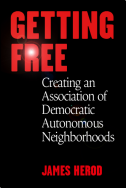
|
|||||||
Three Earlier Books Selected Papers Bibliography (2002) Bits & Pieces Short Takes on Flawed Books Nothing Posted Here Yet Movie Notes Nothing Posted Here Yet Reading Notes Nothing Posted Here Yet
Selected Correspondence Nothing Posted Here Yet |
|||||||
|
|||||||
Essays by other authors Nothing Posted Here Yet Sort by Books by other authors Nothing Posted Here Yet Sort by |
|||||||
|
||||||||
Notes on Building a Movement for Direct Democracy And to Ditch Representative Government at All levels Prepared for a Forum Discussion at the ‘We Are Resisting’ Conference James Herod, June 2004 By ‘Direct Democracy’ I mean decision-making in assemblies through face-to-face discussion, deliberation, and voting, and an association of such assemblies built up through negotiated agreements (pacts, treaties), not through federation (or confederation) using delegates. The term has also been widely used in recent years to refer to referendums and recalls, which is an unfortunate restriction and weakening of the concept, which originally referred to direct participatory democracy, as in a town meeting. I stick to the original meaning of the term. On the Ground 1. All activists who are in a position to do so (and are interested in direct democracy) should attempt to establish either a neighborhood assembly, a workplace assembly, or an extended household assembly (that is, the merging of small households, families, and individuals in a neighborhood to form larger units of 50-100 people). These are the social forms through which we will be able to defeat capitalists and build a new social world. This should take priority over other more common activities like setting up infoshops, protesting in the streets, feeding the poor, and even over building organizations of anarchists for the purposes of propaganda and agitation. In the Movement 2. The split in the movement over neighborhood versus workplace organizing must be overcome. Direct democracy activists need to launch a campaign to convince anarcho-syndicalists that under anarchy all cooperative projects will come under community control (for allocation of resources, or for decisions to start up, or shut down, for example). Libertarian municipalists need to be convinced that struggles at the workplace are an integral part of defeating capitalists. If this campaign of persuasion fails, a new wing of the movement needs to be built which integrates the two tactics (and adds struggles for self-governing, expanded households). 3. So-called ‘individualist anarchists’ need to be convinced that individual freedom is a social achievement, and that anarchy is not merely "an aggregate of autonomous individuals" but new social forms through which genuine self-government can be achieved. Failing in this, which seems likely, a movement for direct democracy (i.e., anarchy, communism) must simply bypass, and sideline, as far as possible, the individualists, who represent the greatest threat, within the movement, to the revolutionary struggle for freedom. 4. A campaign needs to be launched to try to persuade nongovernmental organizations, almost all of which are based on hierarchical, managerial structures, to convert to direct democracy. Similarly, all the organizations which we ourselves create, whether publishing projects, bookstores, media projects, or single-purpose initiatives, need to operate on the basis of direct democracy, not through the typical practice of electing officers. Many, perhaps most, of the existing worker co-ops have reverted to managerial structures, although many of them started out as directly democratic projects. This needs to be reversed. A campaign might even be launched to convince the twenty thousand small towns left in the United States with a population of 10,000 or less to ditch representative government (mayors, city councils), in favor of direct democracy. Nothing is stopping them, and it would be easy to do, if they only wanted to. 5. Direct Democracy should be practiced in regional associations. A common structural form in many radical organizations (e.g., Students for a Democratic Society in the ‘60s, and Northeastern Federation of Anarcho-Communists today) is to have local member collectives or chapters which are bound together through an annual general assembly, which sets policy for the whole organization. I believe this structure should be abandoned. Instead, proposals should be discussed and voted on in each local collective, but with the votes being tallied across all collectives. Nefac has in fact invented a procedure for doing this, but they use it only for minor things. There could still be an annual general meeting. It’s just that it wouldn’t be a decision-making body. 6. An effort should be made by anarchist groups and organizations to link up with the existing networks of worker and consumer co-ops. In the Media 7. A magazine is badly need which will ferret out and publicize actual experiments in direct democracy taking place all over the world. It would be a project to help the movement for direct democracy (if in fact there is one) become conscious of itself, something similar to what the Grassroots Economic Organizing newsletter has done for the movement for self-managing worker co-ops. 8. Beyond this there is simply a need for more propaganda work, to try to get the concept of direct democracy back into the air, and to get reports on experiments into as many media outlets as possible. In Theory 9. As far as I know, there is not a single, adequate, full-scale, scholarly book which defends direct democracy in opposition to representative government. This shortcoming ought to be overcome as soon as possible. 10. The concept of Federation (or confederation) needs to be scuttled. It compromises the movement for direct democracy, and prevents us from inventing procedures for building territorial associations of directly democratic assemblies, through either negotiated agreements or territory wide vote tallying. |
||||||||
